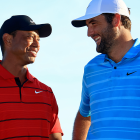
In a golf world with a Tiger Woods-shaped void at the present moment, it is fitting that in the first massive tournament since Woods rolled his SUV in Los Angeles, his protege, Justin Thomas, held The Players Championship trophy at the end of the week.
J.T. is obsessed with being great, and -- outside of the club twirls and world-class iron play -- that is his greatest commonality with Woods. A preternatural internal drive that all the money in the sport cannot satiate is one of the very few innately-acquired necessary skills required to maintain the level of golf which Thomas desires.
A few years ago, I ran into someone who had spent time with J.T. on a Friday night after he missed the cut at The Players. He was irate in a way that is unusual for top-10-type players in the world. Probably because he knew that at TPC Sawgrass, as he proved this weekend, a narrowly-made cut can lead to an insane last 36 holes.
It's that obsession with being great that informs the trajectory of his career, and looking at the trajectory of his career serves two purposes. The first is to show that, though he is not currently, he will at some point almost certainly surpass Jordan Spieth as the most-accomplished player of his generation (unless Bryson DeChambeau does first). And the second is to show what could be with J.T. when you compare him to the best players a generation ahead of him.
When Dustin Johnson was Justin Thomas' age (28 later this year), he had won just six times and did not have a major championship. His statistics were good, but Thomas' are better. Rory McIlroy had won more majors, but he had also played in a lot more of them. Thomas falls somewhere between the two golfers who now have a combined 51 wins worldwide and six major championships. And he still has nine months left in his age 28 year (Thomas turns 28 in April).
| thru age 28 year | Justin Thomas | Dustin Johnson | Rory McIlroy |
|---|---|---|---|
Events (worldwide) | 192 | 130 | 259 |
Wins (worldwide) | 15 | 6 | 21 |
Majors (top 10s) | 1 (5) | 0 (5) | 4 (16) |
Strokes gained | 1.12 | 1.00 | 1.69 |
Strokes gained tee to green | 1.49 | 1.02 | 1.96 |
That's not to say J.T. is going to win four majors like McIlroy or 25 (and counting) times worldwide like D.J., but the framework is certainly there. The signs of it are everywhere. The variety of wins. The pedigree. The comparisons. The fact that on Sunday he joined Jack Nicklaus, Johnny Miller and Tiger as the only golfers in the last 60 years to win 14 or more times on the PGA Tour before turning 28. And trajectory plus obsession makes for an intoxicating vision.
Thomas is not just great on a spreadsheet either. If you have to boil it down to a hole, watch him play No. 16 from Sunday's round. He hit a hooking runner off the tee that played into the throat of TPC Sawgrass' fulcrum hole. Then he hit a towering, fading 5-wood that ran toward both the pin and the water with the tournament on the line. The shots on the next two holes -- and especially the Houdini driver on No. 18 -- got all the attention, but J.T. played No. 16 the way Pedro Martinez dealt in his prime. You should not be allowed to throw 99 MPH with movement and also 82 that disappears, but here we are.
The most impressive thing about Thomas' actual game is how he can change speeds on you, mostly with his wedges but apparently off the tee as well. It's something a lot of players with world-class speed struggle with, but it's probably his biggest weapon.
Thomas is who we thought Spieth was. We have known this for years now, and it doesn't diminish what Spieth has achieved, but the ball-striking crown between those two is not difficult to adjudicate. The question now is whether Bryson is who we thought J.T. was. Will he soon usurp what J.T. has done and what he could be in the future? (Jon Rahm is also up for consideration, but we can have that conversation another day.)
Want the sharpest DFS advice, picks and data-driven golf analysis? Listen below and subscribe to The First Cut Golf podcast where we explain what's happening on the course so you can win off of it.
The difference between J.T. and Bryson is not a variation in will -- both are clearly insanely driven. Rather, it is a variation in curiosity. Thomas knows who he is and what he's trying to do. Bryson, on the other hand, is a walking A/B test. There's always a beta version of the next Bryson lurking in there. And while that can produce some extraordinary results, it can often be a dangerous game to play (see: Rory McIlroy's Friday press conference).
What will be interesting is to see if J.T. can hit this note into his 30s somewhere in between "completely maniacal about the game" and "maybe a little too soft around the edges because of his success." His experience in January when he got popped for using a homophobic slur at the Tournament of Champions, strangely, could help with this.
Thomas implied after he won that he's been seeing a counselor to discuss his emotions, which is something he also talked about earlier in the week.
"Good golf and fun, unfortunately and fortunately, works together for the most part," said Thomas. "I wish my mood and emotions weren't so dependent on my golf, but golf is my life and it is my job, and I care a lot about it and I care a lot about how I play. So it unfortunately does depend or make and break my mood. But I'm trying to get better. I mean, I'm growing up a little bit, but at the same time it means a lot to me and playing well and winning tournaments means a lot as well."
That's a thin line to walk, but if Thomas can find it as his career hits its prime, he's going to be terrifying. As his hero proved, the elixir of obsession combined with staggering talent can take you farther than you ever intended to go, but if J.T. is able to hold onto the reins, it will take him to places nobody else in his generation of golfers could have ever imagined.

















